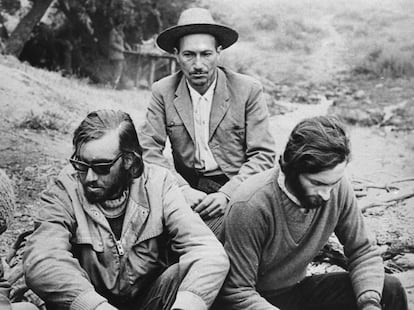Sergio Catalán, the Chilean muleteer who came to the rescue of the Andes tragedy survivors
The farmer was the first person to encounter the Uruguayan rugby players from the plane crash, whose story is recounted in ‘Society of the Snow’


A rugby team, a horrifying plane crash, cannibalism and the miraculous appearance of a muleteer. The story of Uruguayan Air Force Flight 571, which crashed in the Andes Mountains on October 13, 1972, has been revisited in J. A. Bayona’s film Society of the Snow. The film depicts a large part of the true story, yet does not quite fully credit the role of Chilean Sergio Catalán, who played a pivotal role in the discovery and rescue of the 16 survivors.
The farmer, who was a cattle driver in the mountainous area of the city of San Fernando, some 142 kilometers (88 miles) south of Santiago de Chile, was the first person to encounter the survivors, who had been compelled to undertake extreme actions such as eating the remains of some of those who died in the disaster as a means of survival. Although his involvement was instrumental, his appearance in the film is brief.
In real life, Catalán was widely hailed as a hero. He also became a cherished person by the 16 survivors, who came to regard him as a father. The Uruguayans’ bond with the muleteer stretched until his death, in February 2020.
Who was Sergio Catalán?
Sergio Hilario Catalán Martínez was born in 1929 in Puente Negro, a small village located in the foothills of the province of Colchagua (present-day O’Higgins region). He was married to Virginia Toro, with whom he had nine children. At the time of the accident he was 43 years old and as a horse rider he worked transporting animals through the mountains. In December 1972 he was working with Juan de la Cruz, one of his sons, driving cattle near the Barroso River, located south of what is now the Metropolitan Region. It was there that he encountered Uruguayans Roberto Canessa and Fernando Nando Parrado, both members of the Old Christians Club rugby team, who survived the plane crash that claimed 29 lives. The rugby players had embarked on a long expedition from the mountain range of the Mendoza province in Argentina to the Chilean side — the country where they were supposed to land to play a match with the local Old Boys team — to seek help.
First contact with Canessa and Parrado
Catalán and his son spotted the survivors and initially thought they were hunters or tourists. The Uruguayans were frail after their long journey, making their voices inaudible to the muleteer. The Chilean managed to establish communication with Canessa and Parrado by throwing them a piece of paper and pencil, with which one of them wrote the following message: “I come from a plane that crashed in the mountains. I am Uruguayan. We have been walking for ten days. I have an injured friend up there. There are 14 people injured in the plane. We have to get out of here fast. We don’t know how. We have no food. We are weak. When are they going to look for us up there? Please, we can’t even walk. Where are we?”
Alerting the authorities
Catalán traveled some 80 km (50 miles) from the place of the encounter to his hometown. When he arrived at a Carabineros checkpoint, he reported the situation. The police and the authorities did not believe the horseman’s story and thought he might be drunk, but he had with him the written note given to him by one of the survivors. “It was not very credible for us, that there were actually survivors of the Uruguayan plane,” recalled Ramón Canales, one of the co-pilots of the helicopters involved in the rescue, in an interview with the Efe news agency. More than two months after the plane’s disappearance, Chilean operational teams concluded that the accident had left no survivors and that they should only wait until the summer to benefit from the thaw and complete the search for the bodies. Canessa and Parrado were sent to Los Maitenes de San Fernando ranch, where they were interviewed by Chilean television at the time. On December 23, 1972, after an operation lasting two days, all the surviving passengers were rescued.
A friendship lasting almost 50 years
Sergio Catalán was widely regarded as a hero by the rugby players, and a friendship was established that lasted for almost five decades. His name appeared in all the survivors’ accounts and they visited him every time they went to Chile. One of those closest to the muleteer was Roberto Canessa, who as a doctor supported him along with the rest of his friends to get him a hip operation. The muleteer died in February 2020 at the age of 91. “What can I tell you about Sergio that you don’t already know? He’s a very beloved man and we owe him a little bit of our lives, and those of the children and grandchildren that we have,” Canessa told El Mercurio newspaper. Gustavo Zerbino, another of the survivors, attended the funeral on behalf of the rest of the team.
The Chilean received several awards during his lifetime. In 2011 the municipality of San Fernando inaugurated the Monumento al Arriero, a sculpture commemorating him and the countrymen devoted to guiding animals. The Andes 1972 Museum, located in Montevideo, also houses a figure of the legendary Chilean.
Sign up for our weekly newsletter to get more English-language news coverage from EL PAÍS USA Edition
Tu suscripción se está usando en otro dispositivo
¿Quieres añadir otro usuario a tu suscripción?
Si continúas leyendo en este dispositivo, no se podrá leer en el otro.
FlechaTu suscripción se está usando en otro dispositivo y solo puedes acceder a EL PAÍS desde un dispositivo a la vez.
Si quieres compartir tu cuenta, cambia tu suscripción a la modalidad Premium, así podrás añadir otro usuario. Cada uno accederá con su propia cuenta de email, lo que os permitirá personalizar vuestra experiencia en EL PAÍS.
¿Tienes una suscripción de empresa? Accede aquí para contratar más cuentas.
En el caso de no saber quién está usando tu cuenta, te recomendamos cambiar tu contraseña aquí.
Si decides continuar compartiendo tu cuenta, este mensaje se mostrará en tu dispositivo y en el de la otra persona que está usando tu cuenta de forma indefinida, afectando a tu experiencia de lectura. Puedes consultar aquí los términos y condiciones de la suscripción digital.








































